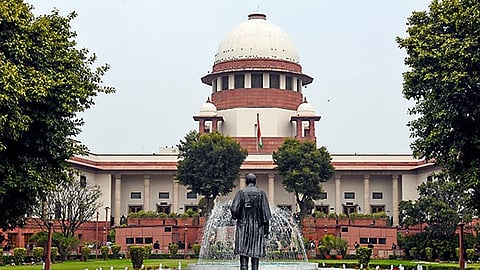
- News
- Campus
- Exam
- Podcast
- Web Stories
- Do You Know
- Path Finders - UG Programs
- Videos
- Book Review

Today, January 7, the Supreme Court (SC) heard the National Eligibility cum Entrance Exam for Postgraduate (NEET-PG) 2024 case and has deferred it to tomorrow, January 8, 2025. The case was about a writ petition seeking measures to ensure transparency in the medical entrance exam and publication of answer keys.
To recall, the hearing was scheduled for December 10 but was postponed for the seventh time to January 7. Yet again, it has been deferred to the next day.
Before a bench of Justices, BR Gavai and AG Masih, Senior Advocate Sanjay Hedge made an urgent mention in respect of the third round of counselling in the NEET-PG exam and sought that the matter be heard soon. The counsel for the respondent informed the court that the counselling for the third round had already commenced and ended on January 4, reported LiveLaw.in.
As the bench in the middle of hearing another matter, Justice Gavai said that the court won't be able to hear the matter today and asked the counsel to mention the matter tomorrow. "Just ask someone to mention the matter tomorrow. If counselling is over, we will dispose of the matter. It's not like we will order fresh counselling," he said.
In the main writ petition, the petitioners sought disclosure of the answer keys and question papers for the NEET-PG 2024 exam, along with other measures to ensure increased transparency.
The plea states that the exam format was changed just one month before the scheduled date, and the exam was converted into a two-session examination with separate papers for each session, which is against the National Board of Examination's (NBE) guidelines of having one common examination.
What did the plea say?
The plea elaborated on the issue of non-disclosure of exam question-answers: "There is a clear lack of transparency in conduct of examinations of NEET PG 2024 since none of the documents which can allow a student to check his/her performance are supplied by the Respondents i.e. neither the (a) question paper, nor (b) the Response sheet filled in by candidates, nor (c) Answer Key is supplied to the students, and merely a score card has been provided along with list of attempted correctly/attempted wrongly sections."
"The students on perusal of the score cards have found discrepancy in the total number of questions that they attempted which are found to be different than what is stated in the score cards issued to them. Thus, there is a basic flaw in the conduct of the examinations which goes to the root of the matter. However, there is no redressal of the above, and an unfettered power has been vested in the Respondents to conduct examinations, without the necessary checks and balances," it added.
No normalisation
Grievances were also raised against the new mark normalisation method. "A new procedure for normalization of scores (based on a system applied in AIIMS which has a different kind of paper) was introduced by the Respondents for calculation of scores obtained by candidates in Session 1 and session 2 and for tie breaking it would be counted to the 7th decimal, which is completely arbitrary as two classes of candidates have been created without any reasonable nexus with object being sought to be achieved i.e. getting the best suited candidates their opted specializations," the plea read.
"The normalisation procedure has completely altered the ranks that students expected to obtain based on their performance in the examination and it has led to clumping of students at each decimal, which would not have happened in case of counting of actual marks. Thus, the specialities will be exhausted on account of some superficial criteria prescribed by the Respondents, which is not reflective of the best candidates available," it added, reported LiveLaw.in.
